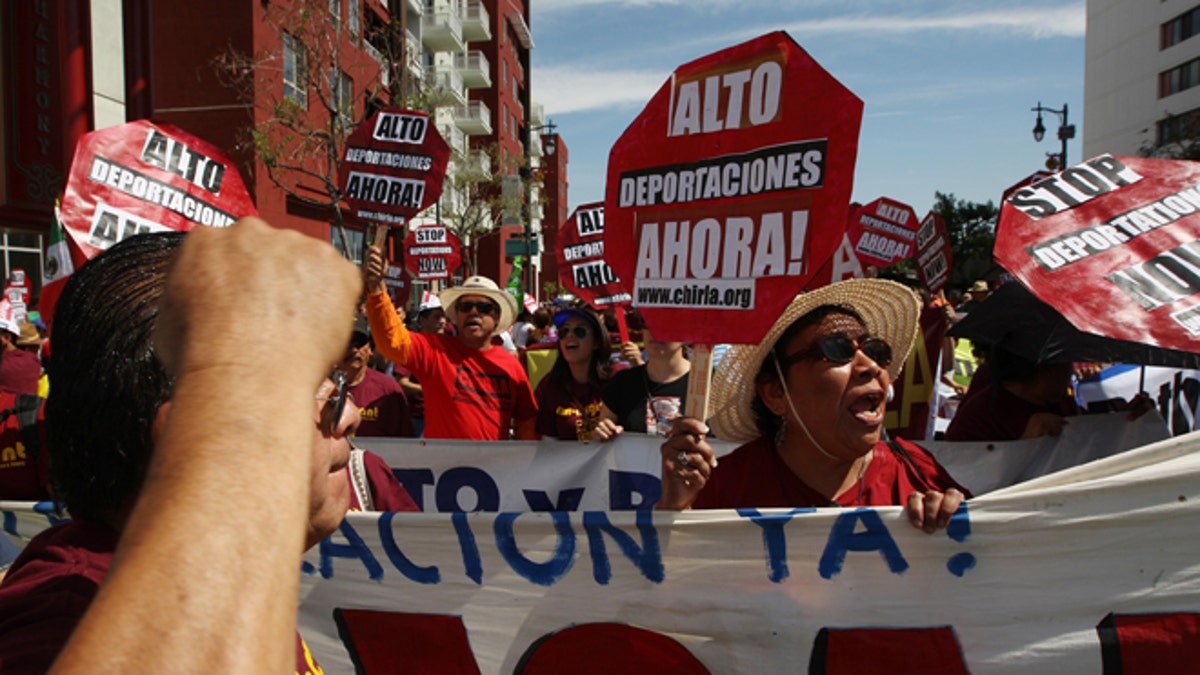
LOS ANGELES, CA - MAY 1: People chant before marching to the Metropolitan Detention Center during one a several May Day immigration-themed events on May 1, 2014 in Los Angeles, California. Demonstrators are calling for immigration reform and an end to deportations of undocumented residents. (Photo by David McNew/Getty Images) (2014 Getty Images)
Manchester, N.H. – Taxes, education, drug abuse and the state’s budget may top the list of issues for the majority of voters in New Hampshire, but for the state’s growing Latino population the top concern when they head to the polls is immigration.
Like most of the Hispanic community across the U.S., in the Granite State Latinos are closely watching how candidates vying for their party’s nomination are discussing the issue that has galvanized this season’s presidential race.
“Immigration is above and beyond the most important issue for me,” Marigen Delgadillo, one of the owners of Consuelo’s Taqueria in downtown Manchester, told Fox News Latino. “Everyone is hoping for some sort of amnesty.”
Amnesty became a major talking point ever since billionaire businessman Donald Trump entered the race and slammed the U.S.’s immigration policy and promised to build a border wall and make Mexico pay for it.
New Hampshire’s Latino community does not have the political sway or numbers that Hispanics do in other early voting states – Nevada and more recently Iowa, for example – but in a small state where every vote is fought over, a candidate’s stance on immigration could make or break his or her chance with Latinos.
“Everybody thinks about immigration,” Eva Castillo, the Venezuela-born New Hampshire Immigrant Project organizer, told FNL. “That is the No. 1 issue here.”
The reason why it’s number one is that it’s a topic that strikes close to home for many Hispanics in the state. Whether they’re immigrants themselves or know someone who is undocumented, the issue touches them on a personal level.
“Here in Manchester you have people being taken advantage of because of their undocumented status,” Delgadillo said. “Lower wages, paying overtime, back pay and the overall ability to complain about any working condition.”
It also appears that immigration is becoming a major issue for non-Latino voters in New Hampshire. And that is a large percentage of the state, where only about 5 percent are foreign-born.
Census data from 2014 reports that 3.3 percent of the state, some 43,000 people, is Hispanic. It more than doubled since the year 2000, when it accounted for 1.66 percent.
Immigration, however, is framed by many non-Latinos in New Hampshire not as the personal issue that it is for people like Delgadillo or Castillo, but as an economic and national security issue.
"We have people that are leaching off of our system," Cindy Coutu, a voter in the town of Bedford told the Associated Press. "People that are here illegally are receiving benefits without having worked for it, that's bothersome to me."
Organizers like Castillo are concerned that, as the state’s Hispanic population grows, these new residents will continue to remain in the shadows in fear of repercussions and anti-immigrant feelings.
Back in 2005, the police chief of New Ipswich, which sits along the state’s border with Massachusetts, made headlines across the country by using trespassing citations to go after undocumented immigrants. More recently, Sen. Kelly Ayotte and Gov. Maggie Hassan urged U.S. officials to suspend the refugee resettlement program for Syrians in the wake of the Paris terror attacks.
The rhetoric from Republican presidential candidates like Trump and Texas Sen. Ted Cruz – and to a lesser extent Florida Sen. Marco Rubio – has only ratcheted up the concerns and fears of the Latino community in New Hampshire.
“I don’t take my citizenship for granted. What gives people the right to tell me that I’m not an American?” Castillo said. “We get micro-aggressions every day and I’m tired of this.”
Castillo said that instead of remaining under the radar, Latinos – whether undocumented or legal citizens – need to become more active politically if they hope to combat anti-immigrant sentiments.
“Latinos are invisible here … [they] are not politically active,” she said. “If you don’t speak up, you’re invisible.”




